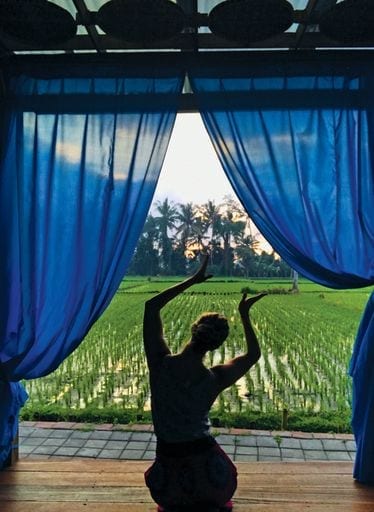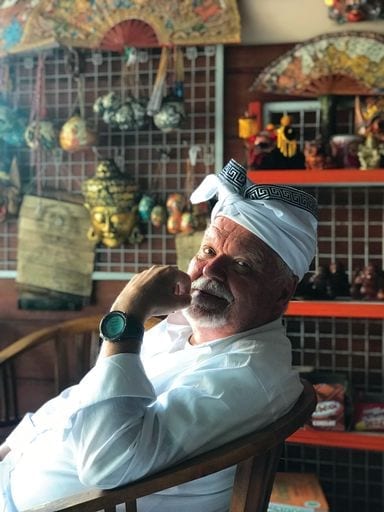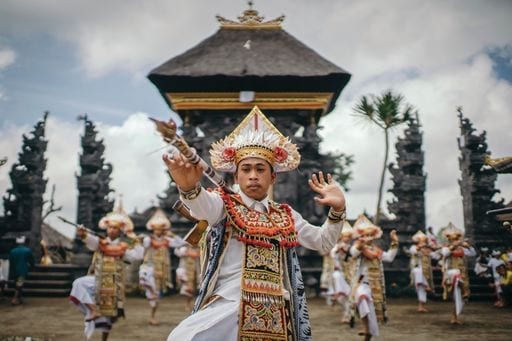I time my workouts to be exactly 30 minutes; fifteen minutes on the first set, focusing on the primary muscles, and 15 minutes on the second set, in which I can incorporate the secondary and fast-twitch muscles. This way, I know I am getting the best results possible without wasting any time.
Google Calendar splits the responsibility with my daily to-do list as I record even the mini-breaks between meetings by way of 15-minute increments. Metered parking forces us to regulate how long we spend at the local shops. And there is no limit to the alarms we can set on our iPhones.
Nothing is too small to be recorded and regulated, all in the pursuit of maximizing our time on earth.

Overlooking a rice field as the sun rises, Mary meditates and practices what she has learned of Balinese dance.
But what if we have it wrong?
I spent the entire month of August in Bali, studying Balinese dance and traditional Balinese masks. I went in pursuit of experience and to deepen my understanding of the world.
Thirteen students from around the globe gathered in Bali to take this three-week course with the humble and brilliant Per Brahe, an acting coach, stage manager and healer (pictured).
We arrived in Bali and were given a schedule with no time markers on it. My brain begged me to put structure onto this artistic chart of experience, and for the first week, I was incredibly frustrated that I never knew when things were going to start and when things were going to end. I argued that I needed to know both how long each class was and the point of the lesson so that I could get the most out of it.
Wrong.
My ego was shouting at me to control this learning experience, that I needed all of the pertinent paperwork beforehand so that I could juice my time in this far-away place. What my ego was really doing was pushing me away from the moment. We all have ego, and if it goes unchecked, our thoughts start to sound like this:
• “I must be the prettiest in the room.”
• “Everyone needs to know how smart I am.”
• “I must be the best at this.”
When our ego is in control, we are comparing our experience, qualifying it and generally missing it. In order to be in the moment truly and fully, you must let go of this type of thinking.
My ego died in Bali.
“You cannot be good at this,” Per explained before our first dance class, assaulting my way of thinking. I am used to dance classes where you learn a combination and practice and practice and then perform at the end. Bali, a society run on song and dance, does it a bit differently. Day one, our dance teacher silently walked to the front of the dance hall. He got in position, his wife started the music and he began to move. Without instruction, without a list of counts, we followed. Again. Again. Again. This went on for weeks. Before my ego died, it put up a fight. The thoughts kept running through my head, “What is the story to this dance? What are the steps? How many times are we going to go through this?”

Her acting coach, stage manager, healer and internationally renowned Balinese mask maker, Per, led a three-week course in Bali on Balinese dance and traditional masks. His free-flowing approach to teaching breaks the western convention of strict structure and time management in the classroom.
Then I heard it again: “You cannot be good at this.”
When the ego is driving, you allow external forces to qualify your experience. You’ve put your happiness in the hands of others:
• You are only good enough if they say you are.
• You are only talented if they recognize it.
• You lack a fundamental trust within yourself.
When the ego drives, you are telling yourself, “I am not enough.” I knew this in theory but had never been able to practice to this degree.
I’m a firm believer that the universe provides us with the lessons we are ready to learn, and this dance class was no different. It was time to surrender to the journey and forget the destination—the Bali way.
I embraced their ease. I didn’t look at my watch. I dismissed the need to explain myself or qualify the moment. I fell into the Bali flow.
Soon, my mind calmed, and my body relaxed. The dance class became a place of joy. As soon as I didn’t need to know what was happening, once I didn’t need control, once my ego stopped driving, I had endless energy. I could dance for hours on end.
“You cannot be good at this.”
What a relief. Can you imagine the freedom we could all experience if we applied this idea to our lives? If we erased the constant competition we have with ourselves and others, we could enjoy things a little bit easier, couldn’t we? Perhaps silencing our ego would strengthen our community, and success would become ubiquitous.
In a small village off of a tiny dirt road, I watched an 80-year-old woman sweep the concrete dance floor that we were to perform on a day later. I watched her move with purpose and ease as she swept the floor that she knows so well. My old way of thinking crept back in as I asked Per, “But how does this woman make a living?” He smiled and explained that the village takes care of its members. “She knows her role in the community,” he said. “She makes her contribution, and whatever she needs, it will be provided.” Then I understood: She was once the tiny dancer in the village, and after passing down the tradition to her children and grandchildren, she now clears space for the dance to continue.

Balinese dance is an ancient dance tradition of artistic expression among Balinese people. It is known for being dynamic, angular and intensely expressive, often used to tell stories through gestures. MARIO ANDI SUPRIA / SHUTTERSTOCK.COM
How can we clear space for the dance to continue? How can we focus our efforts so that generations to come have a clear, open space to explore?
Each one of us has a unique contribution to make, and if you’re spending your energy arranging your life to have the “greatest possible experience”—you’re missing it. We live in an age of reviews, researching our experience before we have it to guarantee that we are, once again, maximizing our time on earth.
My friends, you cannot be good at this. But you can be a part of it.
So be a part of it. Realize that the “greatest possible experience” is the fact that you are you. See that future generations are going to follow your lead, and let that lead be one of community, presence and joy.
So go on. Take a breath, and take a chance on yourself. Be brave, and let go of the schedule. Be brave, and stop judging yourself constantly. Be brave, and step onto the dance floor. You don’t need to know the steps. You just need to show up.
By Mary Rogers McMaster

